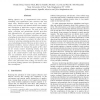Free Online Productivity Tools
i2Speak
i2Symbol
i2OCR
iTex2Img
iWeb2Print
iWeb2Shot
i2Type
iPdf2Split
iPdf2Merge
i2Bopomofo
i2Arabic
i2Style
i2Image
i2PDF
iLatex2Rtf
Sci2ools
CCGRID
2006
IEEE
2006
IEEE
Analysis of Query Matching Criteria and Resource Monitoring Models for Grid Application Scheduling
Making effective use of computational Grids requires scheduling Grid applications onto resources that best match them. Resource-related state (e.g., load, availability, and location), and demand-related state (number and distribution of application resource requests) influence scheduling decision success. The scale of the Grid makes collecting and maintaining detailed up-to-date state information for all resources and requests impractical. Thus, concurrent distributed schedulers must make scheduling decisions based on incomplete resource state information. In this paper, we evaluate the effect that the criteria for selecting scheduling matches have on the success of scheduling decisions. We focus on three criteria: information freshness, resource distance from requesters, and past behavior. We evaluate the quality of the schedule for various resource monitoring models, Grid load models, and Grid overlay topologies. Among our findings is the counter-intuitive result that favoring fre...
| Added | 10 Jun 2010 |
| Updated | 10 Jun 2010 |
| Type | Conference |
| Year | 2006 |
| Where | CCGRID |
| Authors | Ronak Desai, Sameer Tilak, Bhavin Gandhi, Michael J. Lewis, Nael B. Abu-Ghazaleh |
Comments (0)

